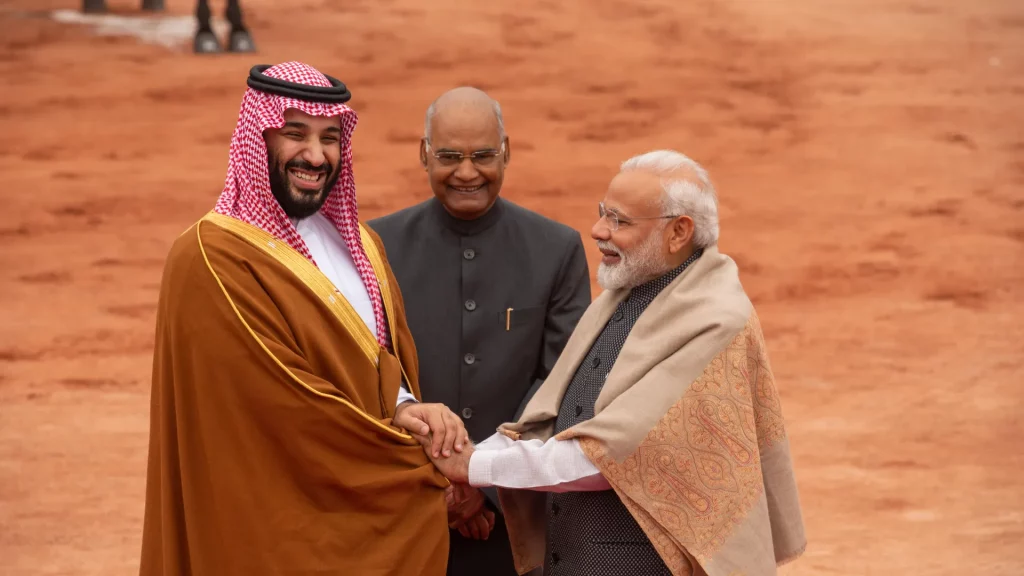IMEC corridor is considered to be a tight slap on China’s economic ambitions in the region
The recently held G20 summit in Delhi had a series of significant announcements made. A surprising one was New Delhi’s declaration being accepted with 100% consensus under the presidency of India for the 18th summit of the Group of 20 – the inclusion of the African Union and passing of the Presidency baton to Brazil for the next year’s summit. The talk of the town is the economic multinational rail and shipping corridor between Saudi Arabia, India, the United States, and the European Union.
India-Middle East-European Economic Corridor (IMEC) connects India, Saudi Arabia, the European Union, the United Arab Emirates (UAE), France, Germany, Italy and the United States. The corridor is divided into two halves, the southern part connecting India with the Persian Gulf and the northern half connecting the Arab region with the European Union.
IMEC corridor is considered to be a tight slap on China’s economic ambitions in the region. The White House is using this opportunity to counter China’s Belt and Road Initiative by resurrecting itself as a reliable investment and development partner for the G20 nations.
Jake Sullivan, the national security advisor for the Biden administration, said that the IMEC corridor reflects efficient American leadership and advanced investments. He pointed out that the American investments would improve the infrastructure capabilities for economic growth in the Middle Eastern region and develop it as an important economic trade hub connecting South Asia with Central Asia and Europe. Even President Biden emphasised in his speech that it’s a really big deal.
Earlier this year, China made headlines by becoming a mediator in the Middle East by mediating a Saudi-Iran deal, countering the hegemony of the United States in that region. This pushed the White House to come forward and make a move on its own, which resulted in talks for Saudi recognising Israel as a country of certain conditions assured by Washington. The Saudi-Israel link is important for both the upcoming US elections and for the corridor as well.
Developments for the deal
There are suspicions as to how the deal will function as it involves numerous countries with diversified interests. But most of the corridor has been constructed easily in batches. Etihad Rail, a 1,200 km long railway line that is a part of the $100 billion Gulf Cooperation Council (GCC), aims to connect the important Middle East and countries like Saudi Arabia, Qatar, UAE, Kuwait, and others. The Saudi Rail network is another bridge to connect the transport line from the ports on the Gulf Coast to the borders of other Central Asian nations. These two railway lines can lay the foundation stone of the corridor. Both of them have signed a strategic agreement for cooperating in services exchange.
Maersk’s, the logistic giant, has a dedicated India-Gulf feeder service, Shaheen Express, that has been loaded with for shipping FMCG products, besides chemicals, textiles, and electronics between the regions. DP World is increasing its logistics capacity by expanding its foothold in the Indian terminal with the concession to build and operate a box facility at the Deendayal Port at Kandla, Gujrat.
These transport lines can be strengthened further with cooperation from Tel Aviv. The talks resembled that the corridor line would be connected from the Adani-led-Haifa port. Further ahead, it would be connected with Italy, but it is unsure about the exact port. Rumours signal that Adani is eyeing the ports of Greece, like Kavala, Volos, or the Alexandroupoli.
The other important component of the IMEC corridor will be the freight costs. Shipping costs went through the roof during the Ukraine war and have now been pacified, but they can rise again. Ship transport is generally cheaper than the roadways, as it can carry massive loads of up to 6,000 tonnes.
The IMEC will also be using the corridor for the transport of clean hydrogen, besides other biofuels. The clean hydrogen industry is where Riyadh is extensively investing to diversify its crude dependence. The IMEC will also lay cables for electrical and digital connections.
